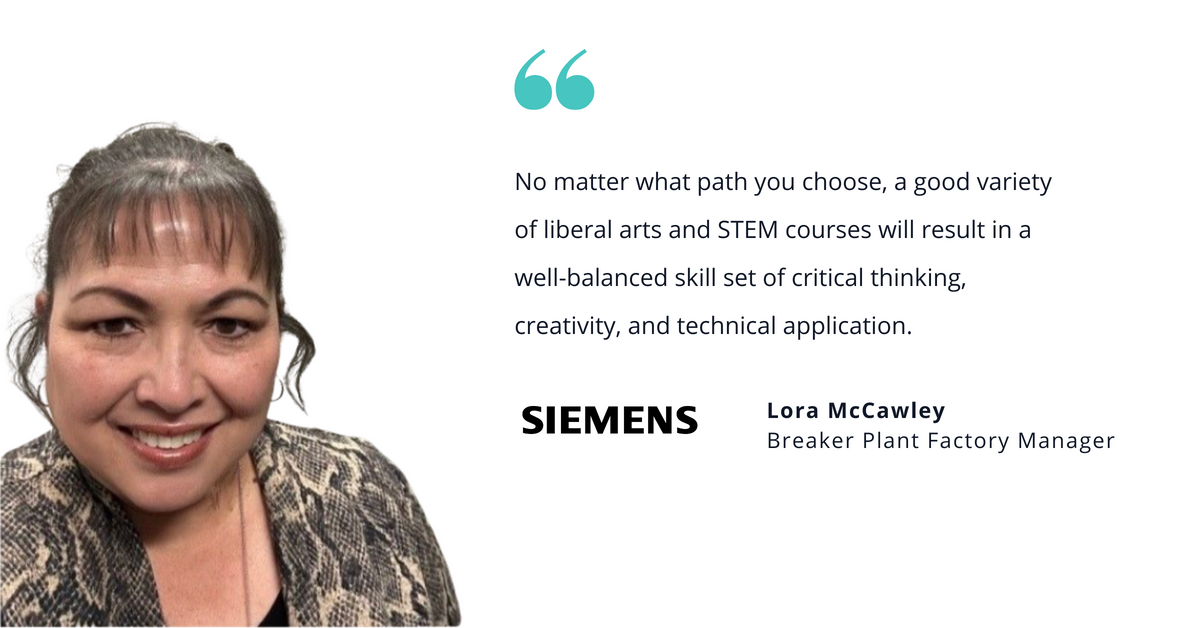After receiving her liberal arts degree, Lora McCawley ended up taking the road less traveled — into manufacturing.
It all started when a friend reached out with an open position as a lab manager overseeing a team of lab technicians.
“I knew nothing about refining or testing but was really good with people,” Lora says. “This role is where I fell in love with manufacturing. I was fascinated by the process of a black, sludgy crude oil transforming into mineral oil and even food-grade wax. I was hooked!”
25-plus years later, Lora is still thriving in the industry — and hasn’t lost touch with her liberal arts background. She’s now a breaker plant factory manager at Siemens where she leans into her communication, leadership, and problem-solving skills to find success.
We sat down with Lora to hear more about how her liberal arts background impacts her work today and get her take on how others can transition into a STEM industry.
Overcoming the learning curve
Coming out of college, Lora admits that she wasn’t up-to-speed on the technical side of manufacturing. However, that didn’t hold her back from excelling in her role.
“While I wasn’t the most technically savvy, I did not hesitate to dive in,” she says. “With good communication skills, troubleshooting, and problem resolution skills, you don't have to be the expert.”
Instead, she surrounded herself with specialists and learned from their expertise to overcome the initial learning curve.
After developing her career at various manufacturing firms, Lora heard about a master scheduler opportunity with Siemens’ facility in Grand Prairie, Texas. She applied, interviewed, and was promoted to manufacturing manager with a team of 50 people within six months.
“Apparently, it’s just not in my DNA to be an individual contributor,” she says with a laugh, highlighting how that same leadership mindset she gained in her liberal arts education continues to drive her career today.
Leveraging her educational foundation as a manager
Lora believes that a liberal arts education teaches a strong sense of social responsibility, humanity, and teamwork. And as a manager, she taps into this foundation daily.
“I roll up my sleeves and work alongside the entire team,” she says. “They need to know that I care about them in and outside of the workplace. This builds loyalty and trust within the team and allows us to accomplish anything.”
Lora also leans into empathy and listens carefully to her team members, ensuring they have the resources they need to succeed in their roles.
“It's all about the people and the work community, regardless of your strategy or business model,” she says. “It's about creating a foundation, a platform, or common ground where the team comes together to tackle the most challenging problems with creative, innovative solutions. A place where challenges are welcomed just to prove we can accomplish whatever we set our minds to. That’s the team I am happy to be a part of today.”
Liberal arts vs. STEM? You don’t have to choose
When we ask Lora for insight into how professionals with a liberal arts background can pivot into manufacturing, she reminds us that it’s not an either/or situation.
“STEM majors should absolutely have some liberal arts experience. Applying sciences to real-world challenges requires the critical thinking and logical rationale that a liberal arts education will teach you. No matter what path you choose, a good variety of liberal arts and STEM courses will result in a well-balanced skill set of critical thinking, creativity, and technical application,” she says.
Lora emphasizes that diverse teams perform better — so no matter your background, you can bring value to a new industry.
“A diverse team brings different ideas, new inputs, and a broader range of skill sets,” she says. “As various cultures and backgrounds come together, the opportunity for creativity increases which yields happier and more engaged employees.”
Create a better #TomorrowWithUs. Check out the open roles here!




